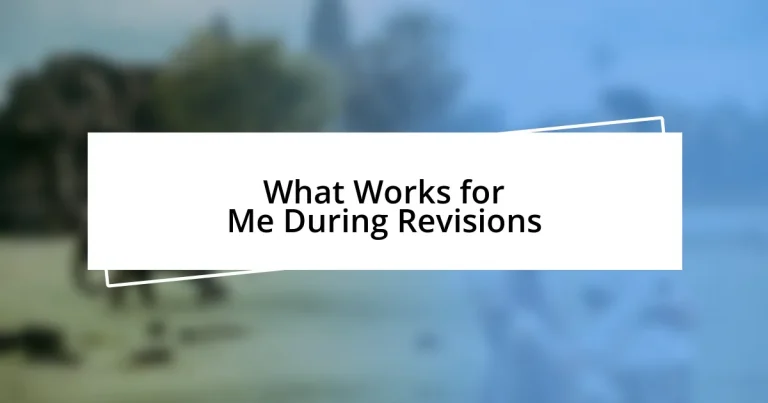Key takeaways:
- Taking breaks during revisions allows for fresh perspectives and can reveal areas needing improvement.
- Utilizing techniques like the Pomodoro Technique, task prioritization, and time blocking enhances productivity and accountability.
- Organizational techniques such as outlining, color coding, and maintaining a revision journal can streamline the revision process.
- Creating a dedicated study environment and minimizing distractions significantly boosts productivity and focus.
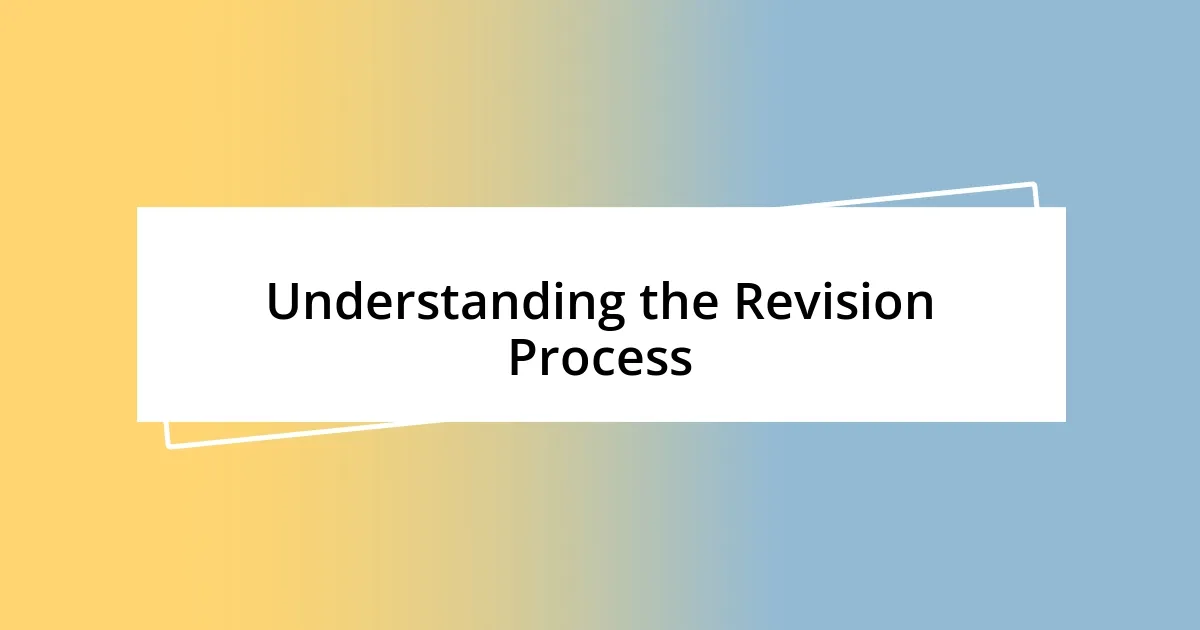
Understanding the Revision Process
The revision process can feel daunting at times, much like sculpting a block of marble into a stunning statue. I remember staring at my first draft, overwhelmed, as I realized that a solid piece often emerges from layers of edits and cuts. Isn’t it fascinating how we can turn confusion into clarity, piece by piece?
During revisions, I’ve learned the importance of stepping away for a fresh perspective. I often take a break, allowing my mind to reset. When I return, those parts that previously felt perfect often reveal the areas that need reshaping. How often do you give yourself that much-needed distance?
Emotions play a crucial role in how I approach revisions. Sometimes, I find myself wrestling with frustration, especially when a section isn’t flowing as I envisioned. Yet, I’ve come to appreciate those moments; they often lead to deeper insights about my writing. Have you ever experienced that breakthrough after grappling with a stubborn piece?
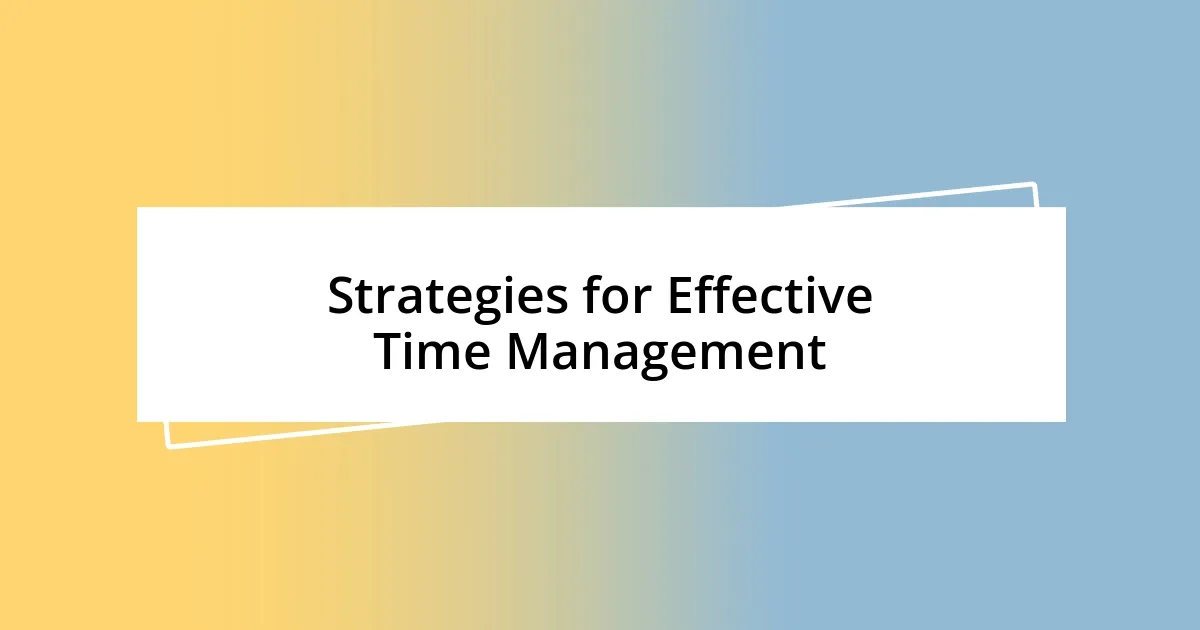
Strategies for Effective Time Management
Managing your time effectively during the revision process is pivotal. One strategy that has worked wonders for me is the Pomodoro Technique. It encourages focused bursts of work, followed by short breaks. I remember trying it for the first time; I felt amazed at how much I accomplished in just 25 minutes! Have you ever noticed how a ticking clock can sharpen your focus?
I also find it beneficial to prioritize tasks. Listing out what needs to be revised and then ranking them based on complexity helps me feel grounded. I recall diving into revisions without a plan, only to feel lost halfway through. Now, tackling simpler sections first boosts my confidence, enabling me to approach the more challenging parts with renewed energy. Do you have a strategy that helps prioritize revisions?
Besides, blocking out specific time slots in my calendar acts like a commitment. I treat revision periods as unmissable appointments, similar to meeting a friend for coffee. It helps me stay accountable. There’s something empowering about marking off those slots after a productive session; it’s like giving myself a small victory. How do you hold yourself accountable during revisions?
| Strategy | Description |
|---|---|
| Pomodoro Technique | Work in focused bursts of 25 minutes followed by 5-minute breaks to enhance productivity. |
| Prioritization | List tasks based on complexity to tackle easier sections first and build momentum. |
| Time Blocking | Schedule specific periods in your calendar dedicated solely to revisions, treating them as unmissable appointments. |
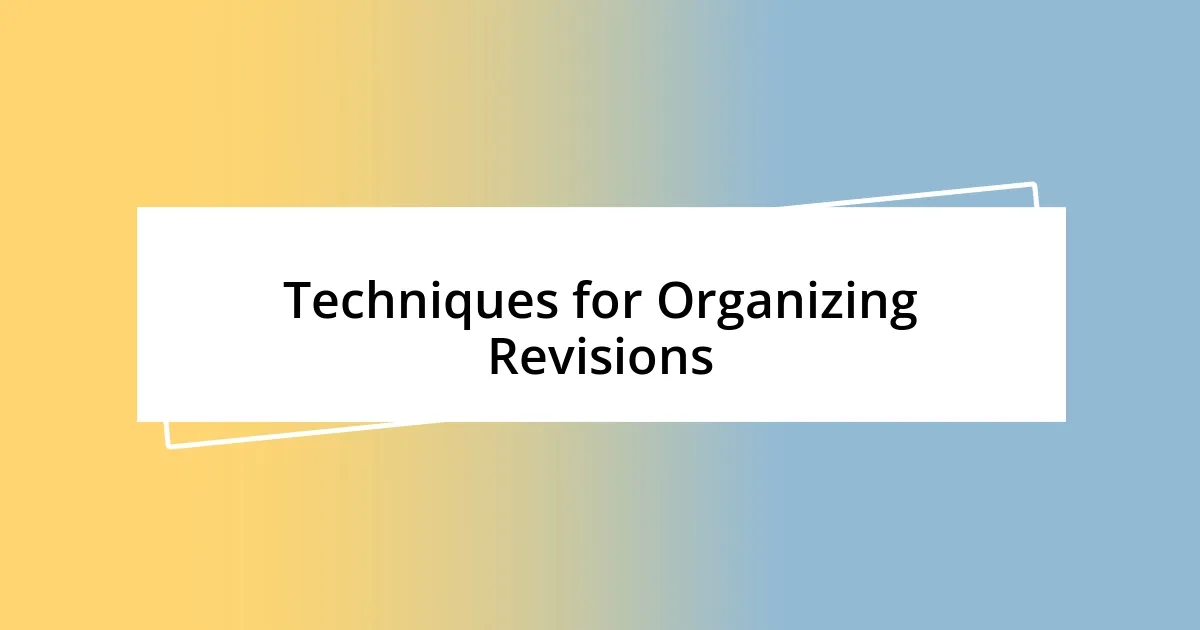
Techniques for Organizing Revisions
I’ve discovered that organizing revisions can really streamline the process. One technique that resonates with me is creating an outline or a mind map to visualize the overall structure of my work. This not only helps me identify areas needing attention but also serves as a motivational tool. I remember once grappling with a particularly convoluted chapter. Producing a visual guide made all the difference, allowing me to break it down into digestible parts. Have you ever tried mapping out your thoughts in a similar way?
Here are some techniques I recommend for organizing revisions:
-
Outlining: Draft a clear outline of your work, separating sections that need heavy edits from those requiring just a polish to focus your efforts effectively.
-
Color Coding: Use different colors to highlight issues, such as grammar, structure, and style. This method creates a visual cue that directs your attention where it’s most needed.
-
Revision Journal: Keep a journal documenting changes and insights gained during each revision session. Reflecting on these notes not only reinforces growth but also provides an emotional release, allowing you to celebrate small victories.
-
Checklist Approach: Develop a checklist based on common mistakes or areas you tend to overlook. Each tick feels rewarding and keeps you accountable.
These techniques have not only upgraded my revision game but have also transformed the process into a more engaging and enjoyable experience. It’s amazing how a little organization can provide clarity amidst the chaos!
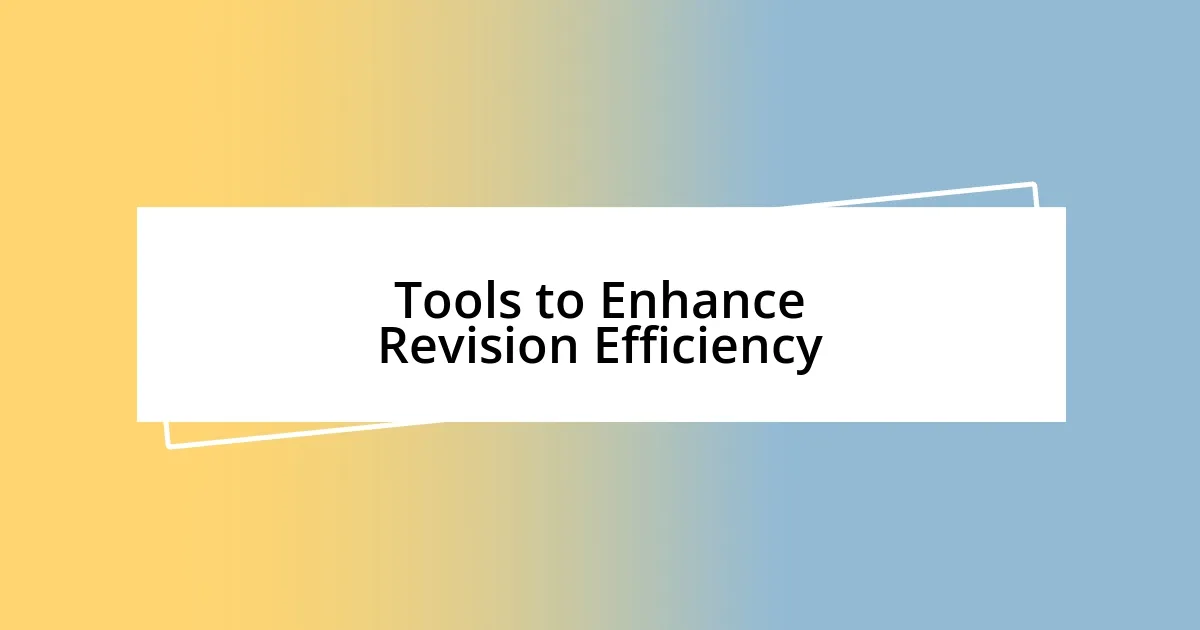
Tools to Enhance Revision Efficiency
When it comes to enhancing revision efficiency, I can’t recommend digital tools enough. One that I’ve grown particularly fond of is Grammarly. Not only does it flag grammatical errors, but it also offers suggestions for clarity and style. The first time I used it, I was surprised to see how many small mistakes I missed—and how they affected the overall quality of my writing. Have you ever felt like your writing could be clearer? Seeing suggestions pop up as I typed made me more mindful of my word choices.
Another tool that I find indispensable is Evernote. It allows me to capture thoughts on the go, which has been a lifesaver during the revision stage. I remember sitting in a coffee shop, suddenly struck by a brilliant idea for a section I was revising. I quickly jotted it down in Evernote. If you’ve ever had a great idea slip away because you didn’t write it down immediately, you know just how significant this can be. Is there a tool you use to capture inspiration when it hits?
Additionally, collaborative platforms like Google Docs have transformed how I revise. Sharing my work with a trusted friend for feedback is incredibly helpful. The first time I received constructive comments, I felt a mix of vulnerability and excitement. It was enlightening to see my writing from a different perspective. Have you tried sharing your drafts for real-time input? Engaging with others not only sharpens your piece but infuses it with fresh ideas, making the revision process more interactive and less solitary.
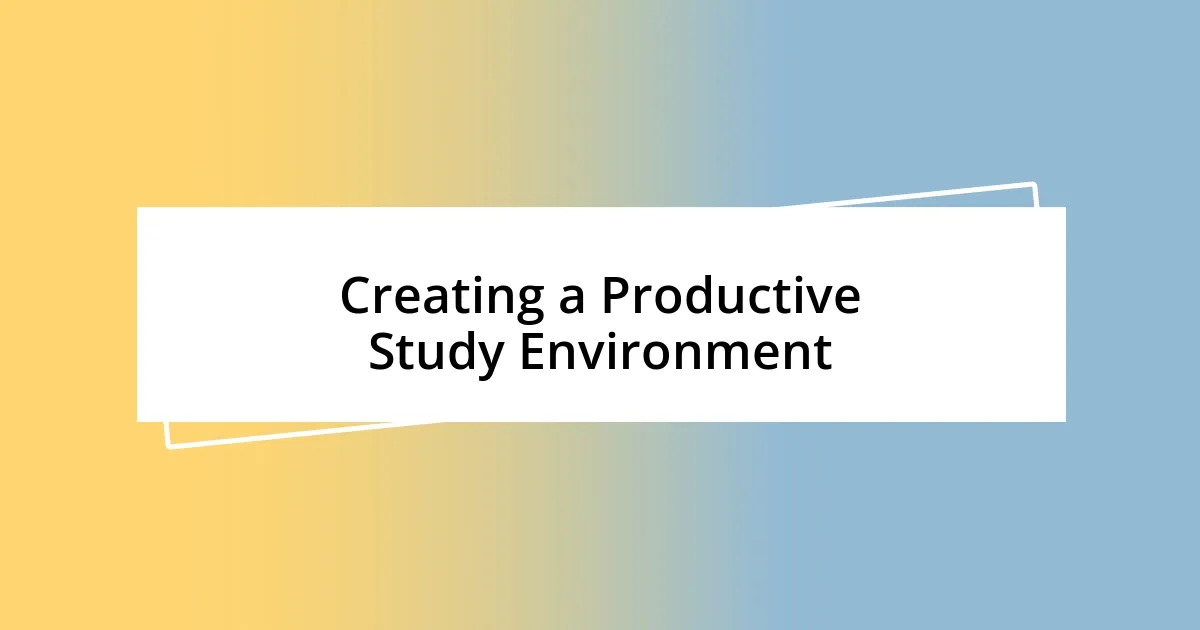
Creating a Productive Study Environment
Creating a productive study environment doesn’t just happen; it requires intention and a bit of finesse. I’ve found that setting up a dedicated study space is crucial. When I designate a specific spot in my home for studying, I signal to my brain that it’s time to focus. Recently, I rearranged my workspace to face a window, and the natural light boosts my mood and productivity. Have you ever noticed how much your surroundings can influence your mindset?
Another essential element is minimizing distractions. I’ve experimented with different techniques to achieve this, including using noise-canceling headphones and placing my phone in another room. One evening, I decided to turn off all notifications while working on a tight deadline. The amount I accomplished in that focused time blew me away! It was like opening a floodgate of concentration. I wonder if you’ve ever tried unplugging from your usual distractions to see what you could achieve?
Finally, I believe that personal touches in your study environment can enhance your productivity. Adding elements that inspire me—like motivational quotes or plants—can make revisiting a space feel inviting rather than mundane. The first time I placed a small cactus on my desk, I felt an instant boost of creativity. It’s a reminder of resilience and growth. Have you considered how personalizing your space might help you connect more deeply with your work?
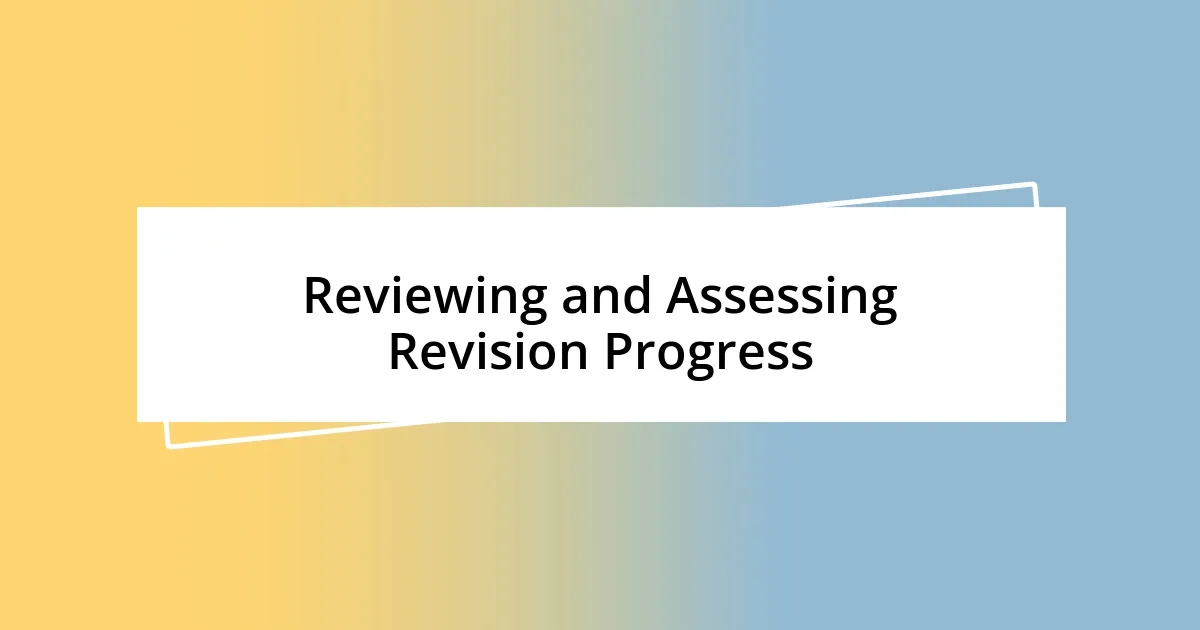
Reviewing and Assessing Revision Progress
Evaluating my revision progress is like taking a snapshot of my growth. I often pause and reflect on what I’ve changed, comparing my initial drafts to the latest version. It’s invigorating to see how my ideas have evolved, and it reminds me of the importance of patience in the writing process. Have you ever looked back at your earlier drafts and felt a sense of pride?
One approach I use is setting specific milestones within my revision stages. For instance, when I’m tackling an essay, I’ll focus first on structure, then clarity, and finally, on language and tone. Once I reach each milestone, I take a moment to assess my work. I remember one time I was halfway through a revision and realized I’d completely shifted the focus—discovering this early on saved me from a lot of extra work later! Has there been a moment when assessing your progress helped you avoid a pitfall?
I also find it helpful to seek feedback at various points in my revision journey. Sharing my work progress with a few trusted peers allows me to gain fresh insights while I’m still shaping my piece. One memorable experience was when a friend pointed out an overlooked theme that completely transformed my conclusion. It’s these moments of collaboration that often lead to the most profound changes. What has feedback taught you about your writing?












